 Yes, you read that right. 2007 brings the fiftieth anniversary of Jean Sibelius’ death, and his tone poem Finlandia was written as a protest against Russian influence in Finland at the end of the 19th century. Joan Baez sung her own a cappella version on Michael Moore’s 2004 Slacker’s Uprising Tour, and in anticipation of the composer’s anniversary year On An Overgrown Path has the full story and an audio file in Sibelius – his genius remains unrecognised.
Yes, you read that right. 2007 brings the fiftieth anniversary of Jean Sibelius’ death, and his tone poem Finlandia was written as a protest against Russian influence in Finland at the end of the 19th century. Joan Baez sung her own a cappella version on Michael Moore’s 2004 Slacker’s Uprising Tour, and in anticipation of the composer’s anniversary year On An Overgrown Path has the full story and an audio file in Sibelius – his genius remains unrecognised.
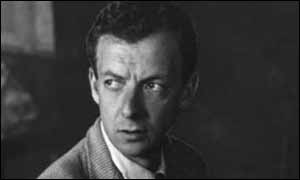
Benjamin Britten, composer, pianist, conductor, pacifist, humanitarian, and visionary, died on December 4th 1976. The thirtieth anniversary of his death is being celebrated with the remarkable story of how he left not just a legacy of 20th century masterpieces, but also a remarkable music vision which is about to be realised after three decades. Take An Overgrown Path to Britten celebrated with new music campus.
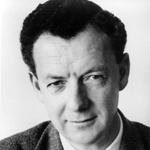 There are three anniversaries today of important events connected by a fascinating thread. November 22nd is remembered by many for the assassination of John F Kennedy in Dallas in 1963, while on a happier note Benjamin Britten was born in Lowestoft on this day in 1913, and quite appropriately today is also the name day of Saint Cecilia, the patron saint of musicians. The connection between these three anniversaries also involves folk singer, political activist and pioneering conservationist, Pete Seeger. The full story is at Benjamin Britten – We Shall Overcome
There are three anniversaries today of important events connected by a fascinating thread. November 22nd is remembered by many for the assassination of John F Kennedy in Dallas in 1963, while on a happier note Benjamin Britten was born in Lowestoft on this day in 1913, and quite appropriately today is also the name day of Saint Cecilia, the patron saint of musicians. The connection between these three anniversaries also involves folk singer, political activist and pioneering conservationist, Pete Seeger. The full story is at Benjamin Britten – We Shall Overcome
 ‘If you’re talking about “relevance to the wider culture” and “speaking to our times“, and all that Greg Sandowian stuff, I couldn’t possibly care less … People seem to forget that there’s always going an audience for whom Beethoven’s 5th or La Boheme is a brand new experience’ – writes Henry Holland today in Killing classical music in the US. Well worth the click, and my photo is of the audience queueing for core classical repertoire at the 2006 BBC Proms.
‘If you’re talking about “relevance to the wider culture” and “speaking to our times“, and all that Greg Sandowian stuff, I couldn’t possibly care less … People seem to forget that there’s always going an audience for whom Beethoven’s 5th or La Boheme is a brand new experience’ – writes Henry Holland today in Killing classical music in the US. Well worth the click, and my photo is of the audience queueing for core classical repertoire at the 2006 BBC Proms.
 All too often today, appealing menus of new music turn out to be measly meals relying heavily on technical gimmickry, self-serving cliques, bitchiness and cynicism. By contrast the Britten Sinfonia at Lunch project is a nourishing meal whose courses include imaginative commissioning, innovative and open-minded programming, a truly international perspective, and some damn hard work from the musicians.. But don’t take my word for it. Here are the words of clarinettist Joy Farrall (above) as she introduced the Huw Watkins first performance at today’s Britten Sinfonia at Lunch concert – ”It is great to see such a large audience for this concert, and it is also really nice to see so many young people here.
All too often today, appealing menus of new music turn out to be measly meals relying heavily on technical gimmickry, self-serving cliques, bitchiness and cynicism. By contrast the Britten Sinfonia at Lunch project is a nourishing meal whose courses include imaginative commissioning, innovative and open-minded programming, a truly international perspective, and some damn hard work from the musicians.. But don’t take my word for it. Here are the words of clarinettist Joy Farrall (above) as she introduced the Huw Watkins first performance at today’s Britten Sinfonia at Lunch concert – ”It is great to see such a large audience for this concert, and it is also really nice to see so many young people here.
For the full story of a pioneering contemporary music project visit New music lunch box
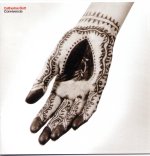 The demise of Tower Records mean tough times ahead for the independent record labels, so it’s great to welcome an unlikely new label which was launced this month with real fighting talk. The FRED label is the brainchild of Fred Mann. Following the success of his contemporary art gallery, Fred [London] Ltd Mann decided to look at his other great love, Music. The label will work as a sister company to the gallery and, like the gallery, will respond in a close knit and creative way to the recording artists it seeks to nurture and promote.
The demise of Tower Records mean tough times ahead for the independent record labels, so it’s great to welcome an unlikely new label which was launced this month with real fighting talk. The FRED label is the brainchild of Fred Mann. Following the success of his contemporary art gallery, Fred [London] Ltd Mann decided to look at his other great love, Music. The label will work as a sister company to the gallery and, like the gallery, will respond in a close knit and creative way to the recording artists it seeks to nurture and promote.
FRED has been set up to record, produce, distribute and promote new music by a wide range of artists. The label, unlike a large slice of the established indie or major labels has the luxury of being able to respond to projects by different recording artist as and when they come up. Rather than setting out to release rock, R&B, classical or pop, FRED will cross musical genres. Despite the variety inherent in how the label will work, FRED has a commitment to quality of the first order and to encourage innovation and experimentation throughout their releases. To celebrate this spirit of diversity, their first two releases are suitably wide reaching.
FRED’s first release is Convivencia (sleeve art above) which features soprano Catherine Bott and an an eclectic instrumental mix of vihuela, lute, guitar (all played by David Miller), oud (Abdul Salam Kheir) and tar, tablah, tbilat and douf (Stephen Henderson). For more on the contemporary art gallery that loves contemporary music, and for a review of Convivencia, follow An Overgrown Path
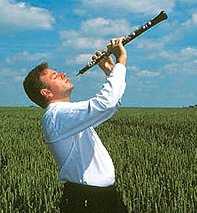 Tomorrow (Nov 6) soloist Nicholas Daniel (left) and the Britten Sinfonia give the world premiere of John Tavener’s oboe concert Kaleidoscopes at London’s Queen Elizabeth Hall. The new work is Tavener’s tribute to Mozart, but, as well as an oboe soloist and chamber orchestra, the score calls for the distinctly non-Mozartian forces of a very large gong and four Tibetan temple bowls. Any John Tavener premiere is big news, but this one is even bigger news because Nicholas Daniel is blogging as he prepares for the first performance. For the full story and links take An Overgrown Path.
Tomorrow (Nov 6) soloist Nicholas Daniel (left) and the Britten Sinfonia give the world premiere of John Tavener’s oboe concert Kaleidoscopes at London’s Queen Elizabeth Hall. The new work is Tavener’s tribute to Mozart, but, as well as an oboe soloist and chamber orchestra, the score calls for the distinctly non-Mozartian forces of a very large gong and four Tibetan temple bowls. Any John Tavener premiere is big news, but this one is even bigger news because Nicholas Daniel is blogging as he prepares for the first performance. For the full story and links take An Overgrown Path.
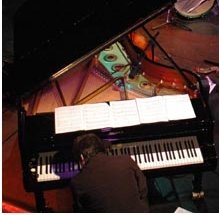 You don’t need to be a rock star to have a different take on the music of John Dowland. Jazz pianist, cellist, accordion player and envelope pusher Huw Warren (left) uses piano, keyboards and samples in his treatment of Dowland’s Lachrymae which is released on CD as Infinite Riches In A Little Room. And Warren’s latest off-the-wall project is a major new work with his Orchestra Helclecs titled This is Now! (Nawr!) featuring the virtuoso guitarist John Parricelli, hip hop MC Nobsta Nutts, singer Lleuwen Steffan and an ensemble originally formed for a concert at Brecon jazz festival in 2004. For more Infinite Riches In A Little Room take An Overgrown Path
You don’t need to be a rock star to have a different take on the music of John Dowland. Jazz pianist, cellist, accordion player and envelope pusher Huw Warren (left) uses piano, keyboards and samples in his treatment of Dowland’s Lachrymae which is released on CD as Infinite Riches In A Little Room. And Warren’s latest off-the-wall project is a major new work with his Orchestra Helclecs titled This is Now! (Nawr!) featuring the virtuoso guitarist John Parricelli, hip hop MC Nobsta Nutts, singer Lleuwen Steffan and an ensemble originally formed for a concert at Brecon jazz festival in 2004. For more Infinite Riches In A Little Room take An Overgrown Path
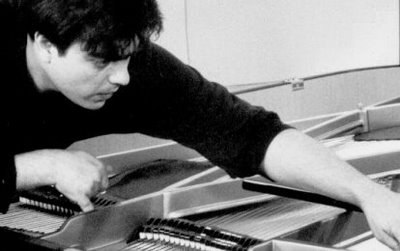
Kalevi Aho, Lowell Liebermann, Áskell Másson, Þorsteinn Hauksson, Haraldur Sveinbjörnsson, Eiríkur Árni Sigtryggsson, Þorkell Sigurbjörnsson, Atli Heimir Sveinsson, Atli Heimir Sveinsson, Björk, the Sugarcubes, Quarashi, Sigur Rós, Minus, Olga Bochihina, Caspar Johannes Walter, Nicolaus Richter de Vroe, Michael Hirsch, Juliane Klein, Vladimir Nikolaev, Moritz Eggert (photo above), and Iraida Yusupova are just some of the contemporary composers from around the globe who have featured On An Overgrown Path during the last week.
New music comes in out of the cold in Iceland highlighted the flourishing new music scene in that remarkable country while A Who’s Who of contemporary composers featured a recently released CD of eight new compositions by German and Russian composers for that most bizarre of instruments, the theremin, and that article prompted a response from Germany from one of the featured composers who explained why Contemporary composers must never be bored. There was even a cautionary tale featuring a well known English composer about how not to compose new music, and, if you can handle it, an insight into the musical tastes of Bill Gates.